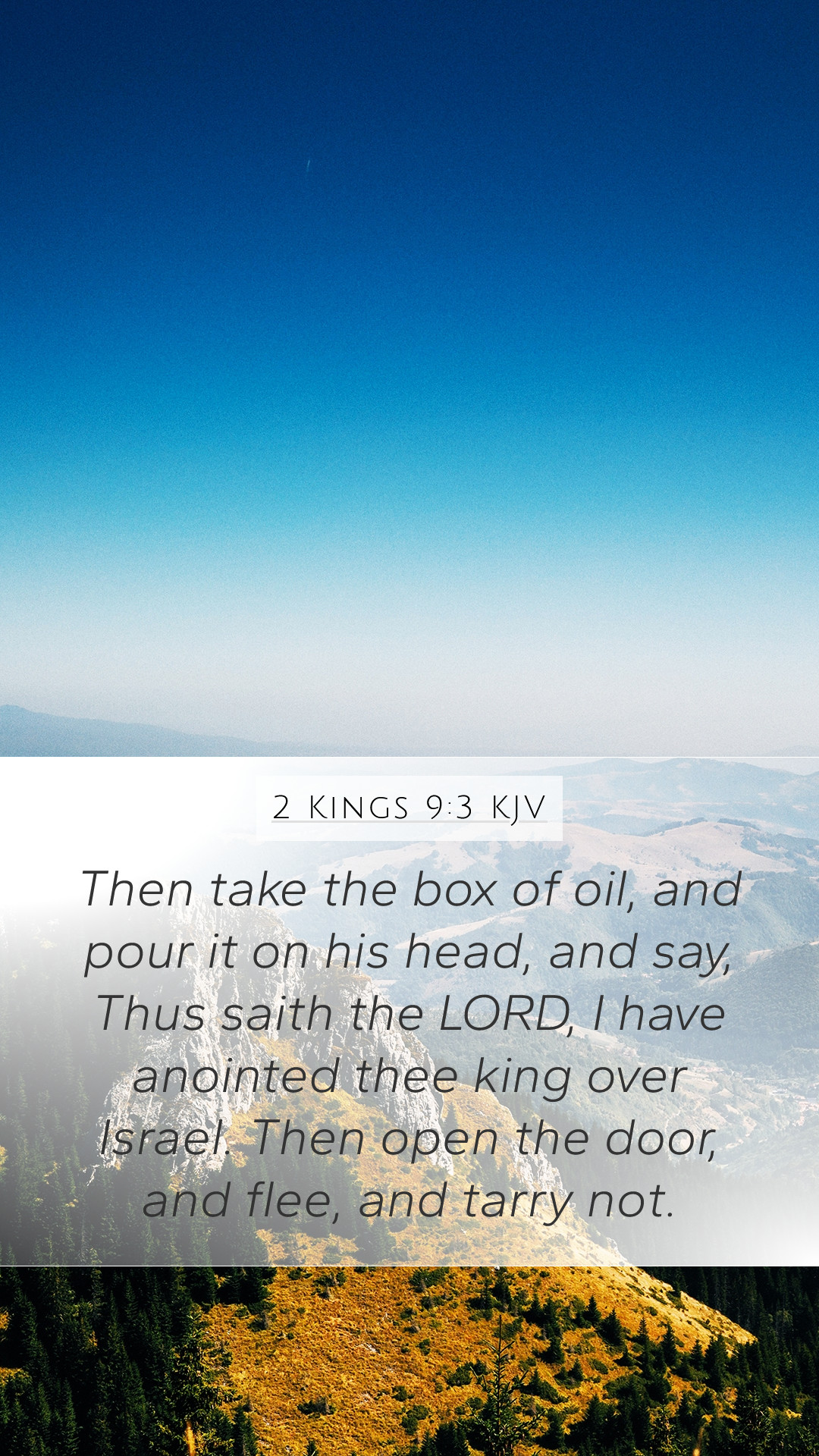Understanding 2 Kings 9:3 - A Comprehensive Bible Verse Commentary
In 2 Kings 9:3, the Lord instructs the prophet Elisha to anoint Jehu as king over Israel. This pivotal moment in biblical history signifies both a change of leadership and a fulfillment of divine prophecy. This verse encapsulates themes of divine appointment, judgment, and the execution of God’s plans through human agents. In this exploration, we will delve into the meanings of this verse through the insights of renowned public domain commentaries such as Matthew Henry, Albert Barnes, and Adam Clarke.
Bible Verse Meaning
The phrase "Take the box of oil" emphasizes the physical act of anointing, symbolizing divine selection and empowerment. Anointing in the Old Testament often indicated that God had chosen a person for a specific mission, accompanied by the Holy Spirit's presence.
Albert Barnes notes that the anointing signifies both a consecration to God and the endowment of authority.
Historical Context
This verse takes place during a tumultuous period in Israel's history when idolatry and corruption were rampant under Ahab's dynasty.
Matthew Henry highlights the historical backdrop of kingship in Israel and the need for divine intervention to restore true worship.
The anointing of Jehu was part of God’s judgment against Ahab and Jezebel for their idolatry, as emphasized in surrounding passages, specifically regarding Baal worship.
Biblical Exegesis
The command to anoint Jehu was not simply a political maneuver; it was a divine directive.
Adam Clarke explains that God's sovereignty is evident as He orchestrates events for the fulfillment of His purposes, demonstrating that earthly kings are ultimately appointed by divine will.
Jehu's anointing initiated a violent but necessary reform to purge Israel of its sins.
Significance of the Anointing
Anointing is a powerful act that carries multiple layers of significance:
- Divine Authority: Jehu received not just a title but God’s mandate to lead. This act underscores the belief that true authority comes from God.
- Judgment and Restoration: The anointing was both a judgment upon Ahab's house and a restoration of proper worship and governance in Israel.
- Fulfillment of Prophecy: Jehu's rise was prophesied, showing that God's plans will come to fruition regardless of human opposition.
Application of the Verse
Modern readers can find practical applications in this verse. It serves as a reminder of God's involvement in our lives and the notion that He appoints leaders for His purposes.
Albert Barnes suggests that believers should trust in God’s sovereign choice of leadership in both spiritual and secular contexts, emphasizing the importance of seeking God’s appointed leaders in the church and society.
Cross References
Relevant scripture that enhances the understanding of this verse includes:
- 1 Kings 19:16: God’s instruction to anoint Hazael and Jehu establishes a prophetic significance.
- 2 Kings 10:1-10: The consequences of Jehu's anointing and his actions against Baal.
- Exodus 30:22-33: The instructions for anointing oil, illustrating the sacredness of the act.
Conclusion
2 Kings 9:3 offers profound insights into divine guidance and the execution of God’s plans through the appointment of leaders.
By examining the verse through the lenses of esteemed commentaries, we garner a deeper understanding of its implications for Israel and contemporary readers alike.
Engaging with this verse allows for further exploration in Bible study groups, online Bible study platforms, and various Bible study resources.
The journey of understanding this verse leads to a richer grasp of Scripture’s layered meanings and encourages individuals to reflect on the role of divine authority in their own lives.


